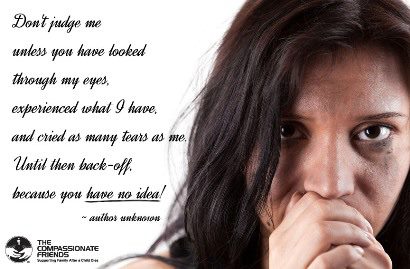Don’t judge me unless you have looked through my eyes, experienced what i have, and cried as many tears as me. Until then back-off, cause you have no idea.
Today Matthew Warren died of suicide. He is the son of Rick and Kay Warren who must be facing the most painful moment in their lives. There is no pain more gut-wrenching than losing a child. My heart and prayers go out to them at this most difficult time.
““No words can express the anguished grief we feel right now,” Warren wrote in a letter to his congregation.
A long time ago, I too lost a son and I found hope and courage in Rick Warren’s The Purpose-driven Life: What on Earth Am I Here For? . The book inspired me to move beyond the pain of losing a son and work on my new normal. Because the book talks about starting a service, I initiated the The Compassionate Friends Philippines Chapter with the help of Cathy Babao and Alma Miclat.

I can’t be there to hug Rick and Kay Warren for their loss and thanking them too for giving me the courage to live this new normal after the death of my son. What I can do is to continue on with my advocacy on suicide prevention and grief education such as ways to comfort the bereaved.
In most of my meetings with the bereaved, a common complaint is the insensitivity of concerned friends or relatives. I see it also in some of the insensitive tweets addressed to Rick Warren questioning the circumstances of his death. Some may not know what to say and blurt out the wrong words.
I have had my own share. I know the depth of concern they have towards us but in their enthusiasm, they blurt out the most insensitive remarks. Newly bereaved are very sensitive to these remarks.
Many parents feel they were being unjustly judged and criticized by those who could not possibly understand because they have not experienced the loss of a child. Compassionate Friends USA shares the proper response.

Our wonderful, concerned, well-meaning friends don’t know. They can only imagine how the newly bereaved feel. They haven’t personally known (thank God) the disbelief, the shock, the anger of losing a child or any loved one. Instead of bringing relief, those words just seem to add to the hurt and the grief. There are no words that will make it all right that someone we loved has died. But there are ways that can soothe the hurt, ease the loneliness and add to the healing. Recently, my sister visited The Compassionate Friends to get tips on how to comfort a family whose daughter died of suicide.
I’d like to share some of the ways to comfort the bereaved:
1. DO feel free to touch , to hug and cry with them if these expressions are appropriate to your relationship. Tell them that you care about their pain and that you are sorry their loved one died. Avoid using I know how you feel, it’s God’s plan or God needed another angel. A simple hug can say more than a thousand words.
2. DO allow the grieving friend or relative to express their feelings, if they express that need. The pain involved in letting go, the anger, frustration and guilt are all a part of the normal grieving process, leaving them empty and without purpose for a long time. Allow them to tell you how they feel. Don’t tell them how you think they should feel. They just need you to listen. You aren’t expected to be able to take away the hurt or to have all the answers. Be careful of clichés, religious platitudes, or easy answers.
3. DO show your concern. Be there over the months on a regular basis. Allow them to tell you how they feel, and listen when they tell you. If you know a certain time of day is particularly difficult, do try to plan your visits to coincide with that time.
4. DO mention their loved one by name. It is comforting for the bereaved to know that others remember their loved one, too. Some people avoid mentioning the loved one’s name for fear it will remind them of their loss. If tears come, then they needed to cry, and the tears may be tears of gratitude that you have given them the opportunity to share their loved one with you. If you have a good memory of their loved one, do share it. It will make their day.
5. DO know that it is difficult for the newly bereaved to reach out to you for help. When you offer help, be specific. For example, you want to take them out for a ride, set a time and date. Bring them to Grief Share ( for all losses due to death) or The Compassionate Friends (for loss of a child) support groups. Make the effort to call, to come by, to help them out six months and even a year down the road. Crowds may be difficult for them. Shopping and holidays will be overwhelming. Offer your help.
There are more ways . Read Do’s and Don’ts To Help A Grieving Loved One .
Here are some quotes or words in expressing how truly sorry you are:
We are truly sorry for your loss. Our heart aches for you and your family.__________ (deceased) was a wonderful child and we will miss him/her terribly.
The bond you and ________ had can not be broken. He/she loved you so much. You will meet again. We are very sorry for your loss.
Words can not express the sorrow and pain we feel for the loss of your _________(son/daughter) _____________ (name).
With our deepest sympathy,_____________
Sometimes, the newly bereaved might not be immediately receptive to your help. But do know that deep inside, they are full of gratitude for your concern . Perhaps, they are just not ready to share, express their feelings or to go out. Each person handles grief in their own distinct way. Just watch out on signs of self-destruction (i.e. staying in bed all day, not eating, alcoholism, illegal drug usage) and a more immediate action might be needed by you.
Related Post
Please read Words of Comfort



Hi! A month ago (on Easter SUnday), my friend’s 10-year-old daughter drowned. I’ve been reading up on grief education to comfort my friend and your posts have been–and are–most helpful.
I heard about this sad news over the TV. How is the family coping?
H, my friend, is slowly learning to accept. I think these things really take time, especially in my friend’s case (tragic, but her first husband–the girl’s dad–passed away 9 years ago so parang the daughter was the only souvenir from that marriage). Good thing my friend has since remarried and has a two-year-old daughter. In her own words, the little girl is the only thing that keeps her from going out of her mind. Told her of your blog to keep her mind off the negative thoughts…
@menchie- You’re a great friend finding all the means to comfort her. Is she based in Manila? I can talk to her if she wants to. for coffee. My contact form is on the navigation bar
Thank you so much for sharing this. I am so sorry for your loss. It is wonderful that you can reach out to help others from your experience. I needed this, and I will link back. Sherri
For information on different support groups,
American Self-Help Group Clearinghouse
http://mentalhelp.net/selfhelp/ or http://www.selfhelpgroups.org
our website provides:
– a keyword-searchable database of over 1,100 national, international, and model self-help support groups for most any specific illness, disability, addiction, bereavement situation, parenting, caregiver concern, abuse, or other stressful life situation;
– listing of local non-profit self-help group clearinghouses worldwide
http://www.mentalhelp.net/selfhelp/selfhelp.php?id=859
– suggestions on starting both community and online mutual help groups;
– information on research of self-help groups – to see a summary of the more rigorous outcome studies (to include a few studies of bereavement self-help groups), you can see a copy of the chapter from the last edition of our Self-Help Group Sourcebook at: http://www.chce.research.med.va.gov/chce/pdfs/Kyrouz%20Humphreys%20Loomis%202002.pdf
– and a registry for those trying to start new national or international support networks that don’t yet exist in the world.
For information on national, online, or model groups, those outside New Jersey can also phone our national helpline at 973-326-6789 (8:30am – 5pm Eastern, weekdays).
One can’t really say anything. Just blandishments … and what use would that be? Yes, I just hug and say tell me what I can do. I sometimes mutter I pray for the person who passed away and more so for the bereaved. I offer to lend a book “Necessary Losses” — but later, a bit later.
I’m so sorry that you lost your son; I lost my 2 year old daughter 2 years ago. I entered the top 5 contest with a similar subject as yours.
top 5 things not to say at a funeral
I will keep this in mind next time I know someone who has tragedy. Thanks..
That’s true, when someone would tell me “I know how it feels”, I become defensive and would say (or think) something like, “No, you dont” or, “do you really?” Of course I know they just want to help, or they probably just dont know what to say, but unless they lost someone before also, it just doesnt feel right hearing “i know how it feels” from them. True: Silence or a simply hug is more than enough.
Very nice! I am the writer of “Top 5 things to do in Istanbul†This was my first group activity, but i liked it very much.
http://meeting-continents.blogspot.com/2007/05/top-5-things-to-do-in-istanbul.html
Have you ever been to Istanbul which links east to west, and west to east like a weblink. Istanbul played such a critical role in the world politics and culture throughout the history.
Now i have a dream i would like to share with you and Darren Rowse. All the Probloggers should meet at Istanbul and join the 29th edition of the Eurasia Marathon on Sunday 28th of October, 2007.
Let’s meet where the continents meet : As the Istanbul Eurasia Marathon starts from the Anatolian side while taking the runners to the most beautiful spots of town, signing its name under a touristic attraction as well. The Bosphorus is one of the most beautiful spots on the world and as you run through it, history of the centuries run with you on the streets.
I joined the 28th Intercontinental Istanbul EurAsia Marathon on 5th of November, 2006 together with my friends, Joe and Suat San. We enjoyed the wonderful Bosphorus, and beautiful streets of Istanbul on a cold but sunny Sunday morning. The slogan for last year’s marathon was “let’s run for a non-smoking worldâ€Â.
this was my blog post for last year’s marathon:
http://meeting-continents.blogspot.com/2006/12/intercontinental-eurasia-marathon.html
I would be happy to invite you to the 29th Intercontinental Istanbul Eurasia Marathon, the only marathon to run between two continents – Europe and Asia. Istanbul is one of the oldest settlements on the world. What about participating in the 29th EurAsia Marathon in 2007 which takes place in the most beautiful places of a wonderful city that has been the capital of three empires ?
You may find details about the marathon here:
http://www.istanbulmarathon.org/english/main.asp
Please let me know if you are interested.
Have a nice day!
Mert
I lost my son Danny on July 1, 2008 to an overdose. He was 22. In dedication to him I formed the first and only Prayer Registry for parents who have lost children.
Please see my website and read about The Prayer Registry. This free website service is dedicated to all of the families who have lost children, whatever age that child was when they passed. This site registers the anniversary day of our children’s crossing. The members of this online
community,the Prayer Team, have the opportunity to honor their child’s legacy, connect with other bereaved parents, and participate in world-wide group prayer for every registered loved one on the anniversary day of their passing.
There is no charge for this service; it is my sincere hope that every bereaved parent who registers a child will join the Prayer Team and be a source of prayer for all of the children on the other side. Each time another child is
registered, the Prayer Team grows larger and stronger.
Please email Sheri at [email protected] to register your loved one on The Prayer Registry. By registering, you will have a forum to connect to other
bereaved parents and I will be able to upload comments, biographies, or any other information you want to share about your child with our community of bereaved parents. Once registered, you will be a member of the Prayer Team and will receive Prayer Registry reminders one day before the anniversary day of one of our kids.
Please feel free to email any questions, concerns or feelings that you would like to share. My door is always open. I hope that this site provides some small measure of balm for the wounds of loss. From one bereaved parent to another, I welcome you to my site and offer my support.
This is one club that none of us would join by choice, but since we find ourselves in this unthinkable place, we stand stronger when we stand side by side.